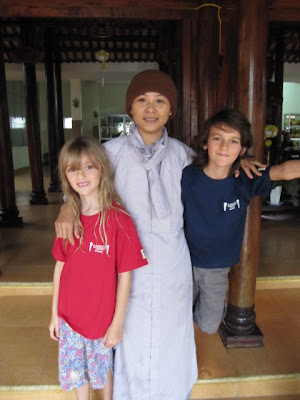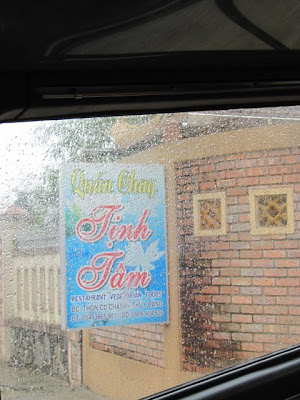
Phuoc Duyen 7-level Tower at the Thien Mu temple entrance.

Traditional Vietnamese women's wear.
You can see why they say Hue women are the most beautiful!


This temple bell is rung by monks 108 times daily at 4am, heard 10K away.
108 for the 108 sufferings we experience in life.
Now there are 109 sufferings, after my kids rung it. Sorry, everyone!

Buddhas people pray to in the temple.

Young monk ringing the bowl bell repeatedly,
looking mighty bored, like he'd rather be playing soccer.
January 4, 2011
Our dragon boat took us to the Thien Mu pagoda (aka temple), at the top of a hill next to the Perfume River. Thien Mu is probably the most beloved of the hundreds of Buddhist temples in the supposedly secular state of Vietnam (70% of Vietnamese practice Buddhism). It is an active Buddhist monastery dating back to 1601. The pagoda’s name translates to “Heavenly Lady”, referring to a legend that an old woman had appeared on the hill, telling the locals about a Lord who would build a pagoda on that very site.
True, the kids were tired of seeing temples by this 2nd week of our 3 week trip across Cambodia, Laos, and Vietnam. But, this temple was so ALIVE and interactive that the kids were fascinated. They first started ringing the temple bell that's rung 108 times each morning at 4am, one for each of our sufferings as humans.
The kids didn't seem to appreciate that they added about 10 more sufferings to our human experience, with each additional ring they inflicted on us. Truth is, the fact that the bell is so loud at 4am, ringing 108 times loudly as far as 10 kilometers away, seems like that bell ringing counts as an additional human suffering for the villagers in a 10K radius. Click
here to see the kids ringing the temple bell.
Buddhist culture on this trip is rubbing off on Abraham. He avidly prays with all the dramatic flourish of local Vietnamese Buddhist devotees. You HAVE to click
here to watch this hilarious video of Boom praying in front of the Thien Mu Buddhas, next to an old Buddhist man praying, eyeing Boom with some confusion and seeming consternation. And, Boom's praying seems to have woken up the young Buddhist monk ringing the prayer bowl.
Even though I now have a Buddhist meditation practice, Boom likes to correct me in how I pray. "Mommy, no, you need to bend like this, not like that. Wait, hold your hands like this. Okay, then pray." It's like Buddha was reincarnated as my 4-year-old and he's coaching me on how to pray, in this 21st century of ours.
Just today Boom said "After you die, you are born again. Mommy, you were born in Nanny's belly. When Papa dies, whose belly is he going to be born in?" Boom must have overheard our guide explaining how Buddhists believe that after you die, you are born again. Funny how certain images and words are seared in a child's memory, even if the words are almost too advanced for them to fully understand. Why did Boom choose these adult words to remember over others? I suspect that he's going through a phase of grappling with the idea of death. At bedtime, he sometimes tells me "I'm not going to die soon, right? I'm not old like Nanny, Papa, Grammy, Harvey, right? Are they going to die soon? When?..." It must have seemed so reassuring to his brand spanking newly 4-year-old brain to hear that he and all his loved ones will just be born again, after they die, into some Mommy's warm belly. But, whose?
 This bad-ass female Buddhist monk (one of the few in Vietnam) drove a motorbike
This bad-ass female Buddhist monk (one of the few in Vietnam) drove a motorbike

 A mom from another family fawned over Boom. Her son was curious about Boom
A mom from another family fawned over Boom. Her son was curious about Boom
 They keep the coffee warm in a water bath. Delicious!
They keep the coffee warm in a water bath. Delicious! An orphan who grew up in the Buddhist temple, on the left. Now he's studying economics in college and speaks great English. He's a waiter to make extra money.
An orphan who grew up in the Buddhist temple, on the left. Now he's studying economics in college and speaks great English. He's a waiter to make extra money.










































